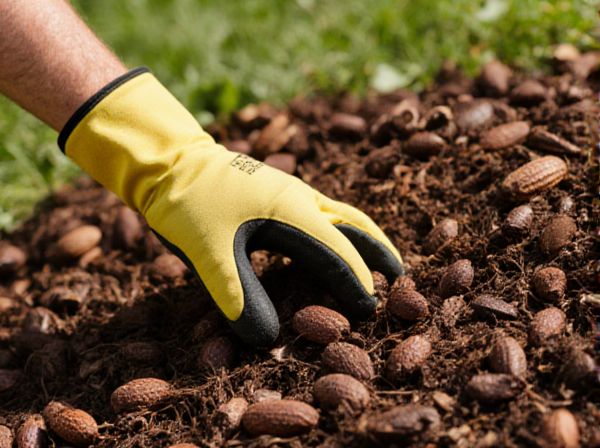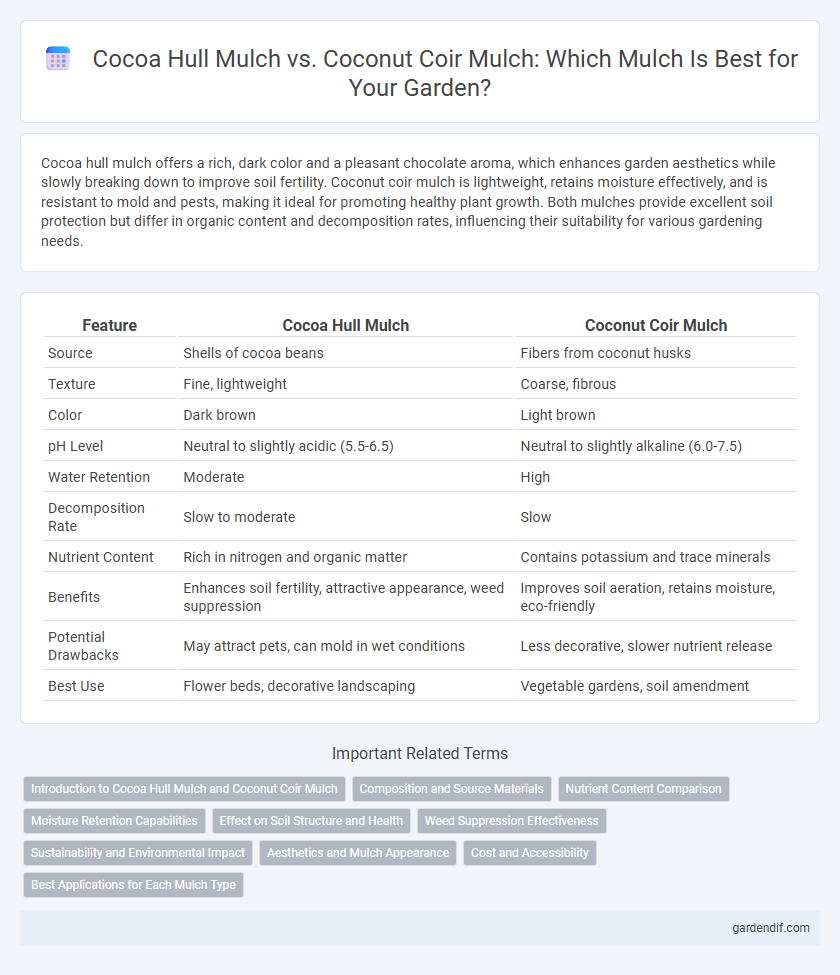
Cocoa hull mulch vs Coconut coir mulch Illustration
Cocoa hull mulch offers a rich, dark color and a pleasant chocolate aroma, which enhances garden aesthetics while slowly breaking down to improve soil fertility. Coconut coir mulch is lightweight, retains moisture effectively, and is resistant to mold and pests, making it ideal for promoting healthy plant growth. Both mulches provide excellent soil protection but differ in organic content and decomposition rates, influencing their suitability for various gardening needs.
Table of Comparison
| Feature | Cocoa Hull Mulch | Coconut Coir Mulch |
|---|---|---|
| Source | Shells of cocoa beans | Fibers from coconut husks |
| Texture | Fine, lightweight | Coarse, fibrous |
| Color | Dark brown | Light brown |
| pH Level | Neutral to slightly acidic (5.5-6.5) | Neutral to slightly alkaline (6.0-7.5) |
| Water Retention | Moderate | High |
| Decomposition Rate | Slow to moderate | Slow |
| Nutrient Content | Rich in nitrogen and organic matter | Contains potassium and trace minerals |
| Benefits | Enhances soil fertility, attractive appearance, weed suppression | Improves soil aeration, retains moisture, eco-friendly |
| Potential Drawbacks | May attract pets, can mold in wet conditions | Less decorative, slower nutrient release |
| Best Use | Flower beds, decorative landscaping | Vegetable gardens, soil amendment |
Introduction to Cocoa Hull Mulch and Coconut Coir Mulch
Cocoa hull mulch, made from the shells of cocoa beans, offers a nutrient-rich, aromatic ground cover that improves soil fertility and moisture retention. Coconut coir mulch, derived from the fibrous husk of coconut shells, excels in water retention, aeration, and weed suppression while being highly sustainable and resistant to decomposition. Both mulches enhance garden health but differ in texture, nutrient profile, and environmental impact, making them suitable for distinct horticultural needs.
Composition and Source Materials
Cocoa hull mulch is derived from the outer shells of cocoa beans, rich in natural fats and nutrients that slowly release into the soil, promoting plant growth. Coconut coir mulch is made from the fibrous husks of coconut shells, providing excellent moisture retention and aeration due to its high lignin and cellulose content. Both mulches are organic but differ in nutrient profiles and water-holding capacities based on their distinct botanical origins.
Nutrient Content Comparison
Cocoa hull mulch offers higher levels of nitrogen, potassium, and phosphorus compared to coconut coir mulch, making it more beneficial for nutrient-demanding plants. Coconut coir mulch excels in moisture retention and aeration but contains fewer essential nutrients, often requiring supplemental fertilization. Understanding the distinct nutrient profiles of cocoa hull and coconut coir mulches helps optimize soil fertility and plant growth.
Moisture Retention Capabilities
Cocoa hull mulch offers excellent moisture retention due to its dense texture, which helps keep soil consistently moist for longer periods. Coconut coir mulch also provides strong moisture retention by absorbing and slowly releasing water, promoting healthier plant roots. Both mulches improve soil hydration, but coconut coir tends to retain moisture slightly more effectively in dry climates.
Effect on Soil Structure and Health
Cocoa hull mulch improves soil structure by enhancing aeration and water retention through its fine texture and organic matter content, promoting beneficial microbial activity. Coconut coir mulch, rich in lignin and cellulose, aids in maintaining soil moisture while slowly decomposing to improve soil porosity and nutrient availability. Both mulches support healthy soil ecosystems but cocoa hull mulch offers faster nutrient release, whereas coconut coir provides longer-lasting soil conditioning.
Weed Suppression Effectiveness
Cocoa hull mulch offers excellent weed suppression due to its dense, fine texture that limits light penetration, effectively inhibiting weed seed germination. Coconut coir mulch provides moderate weed control by creating a moisture-retentive layer but is less dense, allowing some weed growth. Studies show cocoa hull mulch reduces weed emergence more significantly than coconut coir, making it a superior choice for effective weed management in gardens.
Sustainability and Environmental Impact
Cocoa hull mulch offers excellent biodegradability and improves soil organic matter while producing minimal waste by repurposing cocoa industry byproducts. Coconut coir mulch, derived from coconut husks, is highly sustainable due to its rapid renewability and ability to retain moisture effectively, reducing water usage. Both mulches support eco-friendly landscaping, but coconut coir mulch generally has a lower environmental footprint given its abundant availability and lower risk of contamination.
Aesthetics and Mulch Appearance
Cocoa hull mulch offers a rich, dark brown color that enhances garden aesthetics by providing a polished, natural look that contrasts well with vibrant foliage. Coconut coir mulch features a lighter, fibrous texture and tan hue, giving landscapes a softer, more tropical appearance while improving soil moisture retention. Both mulches contribute to garden appeal, but cocoa hull mulch is preferred for a sleek, decorative finish, whereas coconut coir mulch supports a rustic, earthy visual effect.
Cost and Accessibility
Cocoa hull mulch typically costs more than coconut coir mulch due to its limited availability and higher processing requirements. Coconut coir mulch is more accessible globally because it is a byproduct of the widely cultivated coconut industry, resulting in lower prices and easier procurement. Both mulches provide excellent moisture retention, but cost-effectiveness and regional availability often make coconut coir mulch the preferred option for large-scale landscaping projects.
Best Applications for Each Mulch Type
Cocoa hull mulch is ideal for ornamental gardens and flower beds, providing rich nutrients and a pleasant chocolate aroma that enhances plant growth and soil health. Coconut coir mulch excels in vegetable gardens and potted plants due to its excellent water retention, aeration properties, and natural resistance to mold and decay. Selecting the appropriate mulch depends on plant type and climate, with cocoa hulls suited for decorative use and coconut coir preferred for moisture management and soil conditioning.
Cocoa hull mulch vs Coconut coir mulch Infographic

 gardendif.com
gardendif.com